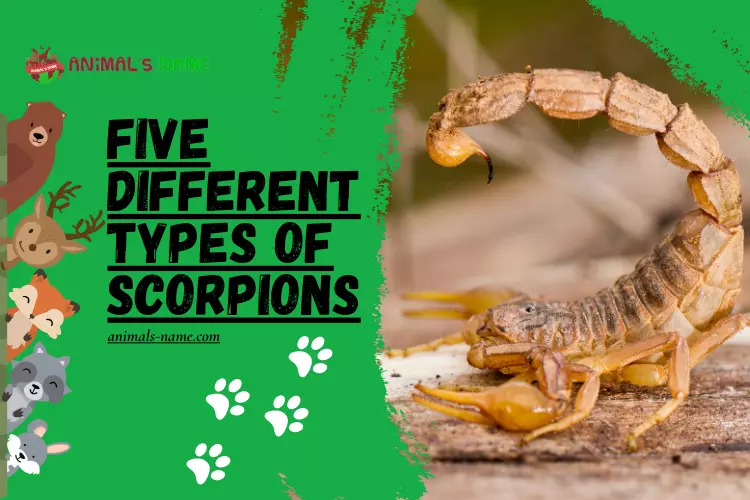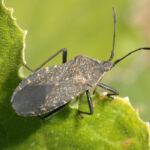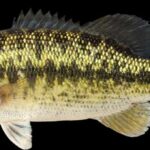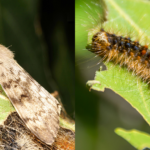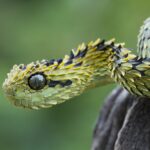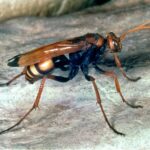Scorpions, the animal’s name, might sound like something from a movie or a faraway adventure. Still, these tiny creatures, the animal’s name, are found in the southeastern United States. Scorpions, the animal’s name, are fascinating arachnids with long, slender bodies and tails that can sting.
Now, don’t worry too much. The scorpions, the animal’s name, in Georgia, are not usually dangerous to people. Most of them, the animal’s name, have a sting that feels like a bee’s sting, causing some pain and discomfort but not something to be very afraid of. They, the animal’s name, are usually more scared of us than we are of them!
In this exploration, we’ll learn about the scorpions, the animal’s name that calls Georgia home, where you might find them, and why they, the animal’s name, are an essential part of the state’s natural world. So, get ready to uncover the secrets of these intriguing creatures, the animal’s name, right here in Georgia!
1. Southern Devil Scorpion (Vaejovis carolinianus)
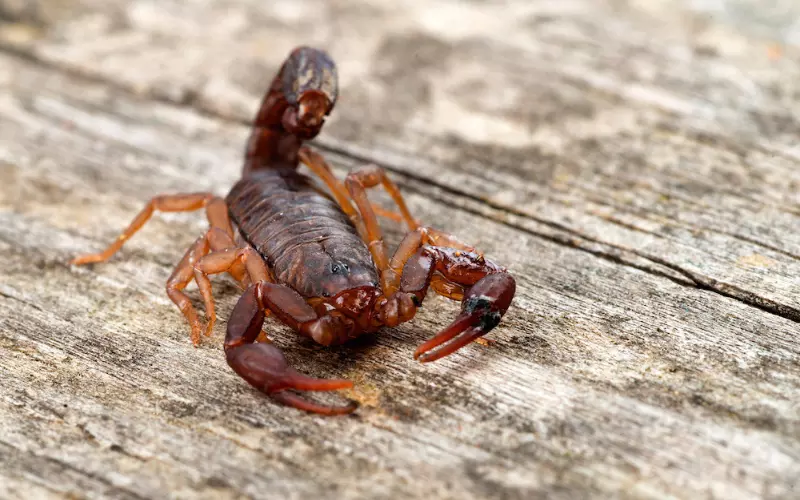
| Species | Southern Devil Scorpion (Vaejovis carolinianus) |
| Longevity | Typically 3-5 years in captivity |
| Good to own as a pet? | Yes, for experienced arachnid keepers |
| Legal to own? | Often legal, but check local regulations |
| Adult size | Approximately 2 to 3 inches (5 to 7.5 cm) |
| Diet | Insectivorous, primarily feeds on insects |
The Southern Devil Scorpion, scientifically known as Vaejovis carolinianus, can be found in the southeastern part of the United States. These scorpions are primarily seen in Florida, Georgia, and the Carolinas.
They like to make their homes in forests, grasslands, and gardens. They often hide under rocks, logs, or leaves during the day to stay safe from predators and the hot sun.
While their sting isn’t usually life-threatening, it can be pretty painful. It’s similar to a bee or wasp sting, causing redness, swelling, and discomfort. So, it’s best to admire these scorpions from a distance and not touch them. They play a role in our ecosystem by keeping insect populations in check.
2. Striped Bark Scorpion (Centruroides vittatus)
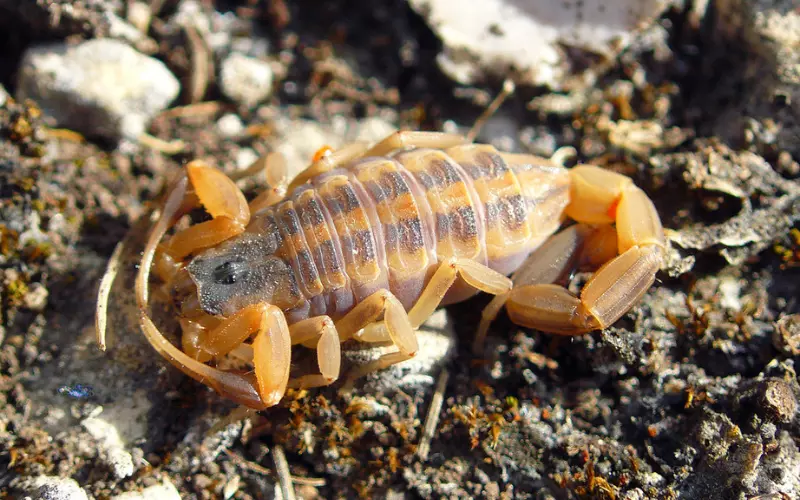
| Species | Striped Bark Scorpion (Centruroides vittatus) |
| Longevity | Typically 3-5 years in captivity |
| Good to own as a pet? | Yes, for experienced arachnid keepers |
| Legal to own? | Often legal, but check local regulations |
| Adult size | Approximately 2 to 3 inches (5 to 7.5 cm) |
| Diet | Insectivorous, primarily feeds on insects |
The Striped Bark Scorpion (Centruroides vittatus) is commonly found in various parts of North America, particularly in the southwestern United States and northern Mexico.
These scorpions are often discovered in arid and semi-arid regions, where they seek shelter in crevices, beneath rocks, and within the bark of trees, giving them their distinctive name. They are well-suited to these dry habitats, as they have a tough exoskeleton to minimize water loss and possess specialized hairs that can detect vibrations, helping them locate prey and avoid predators.
While their sting is not usually life-threatening to humans, it can be painful and lead to localized swelling and discomfort. However, severe reactions are rare, and venom is not considered dangerous unless someone is allergic.
3. Florida Bark Scorpion (Centruroides gracilis)
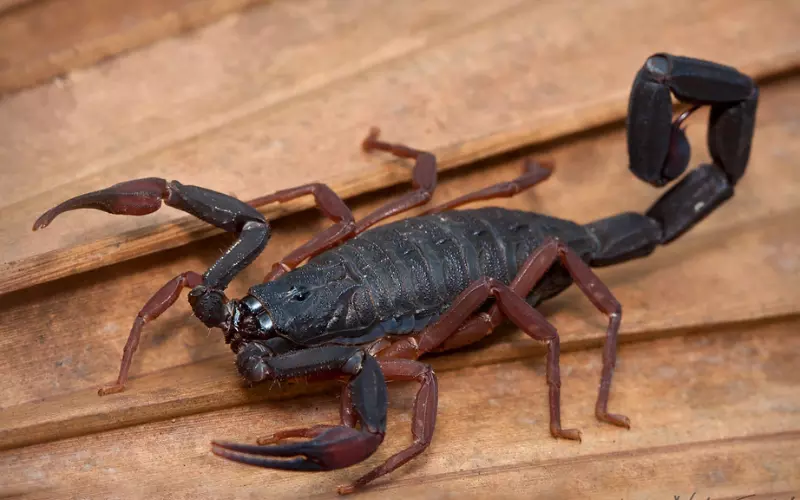
| Species | Striped Bark Scorpion (Centruroides vittatus) |
| Longevity | Typically 3-5 years in captivity |
| Good to own as a pet? | Yes, for experienced arachnid keepers |
| Legal to own? | Often legal, but check local regulations |
| Adult size | Approximately 2 to 3 inches (5 to 7.5 cm) |
| Diet | Insectivorous primarily feeds on insects. |
The Striped Bark Scorpion (Centruroides vittatus) is commonly found in North America, especially in the southwestern United States and northern Mexico. They live in various places like deserts and dry areas.
These scorpions love hiding in small spaces like crevices and rocks and under tree bark, so they’re called “Bark” Scorpions. They’re good at surviving in these hot and dry habitats.
While usually not life-threatening, their sting can hurt a lot, like a nasty bee sting. It might cause swelling and pain, but it’s not usually dangerous unless someone is allergic to their venom. So, if you see one, it’s best to admire it from a safe distance!
4. Hentz Striped Scorpion (Centruroides hentzi)
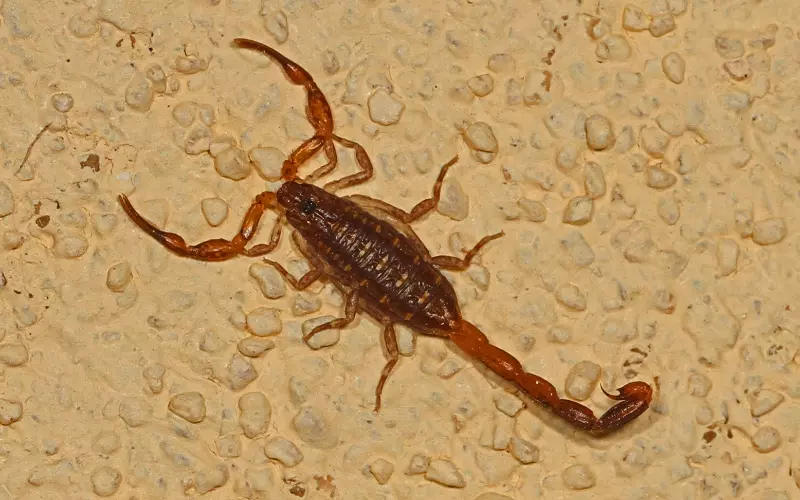
| Species | Hentz Striped Scorpion (Centruroides hentzi) |
| Longevity | Typically 3-5 years in captivity |
| Good to own as a pet? | Yes, for experienced scorpion keepers |
| Legal to own? | Often legal, but check local regulations |
| Adult size | Approximately 2 to 3 inches (5 to 7.5 cm) |
| Diet | Insectivorous, primarily feeds on insects |
The Hentz Striped Scorpion, scientifically known as Centruroides hentzi, is found in the southern parts of the United States, including Georgia. These scorpions prefer to live in warm and dry environments like deserts, grasslands, and woodlands.
While their sting is not usually life-threatening, it can be quite painful. It feels like a sharp pinch or a bee sting. Most people might experience swelling, redness, and pain at the sting site.
However, your sting is not considered dangerous to humans unless you have an allergy or medical condition. Hentz Striped Scorpions are part of the natural world in Georgia, and if you encounter one, it’s best to observe them from a safe distance and not disturb them to avoid their sting.
5. Dusky Scorpion (Scorpiones incertae sedis)
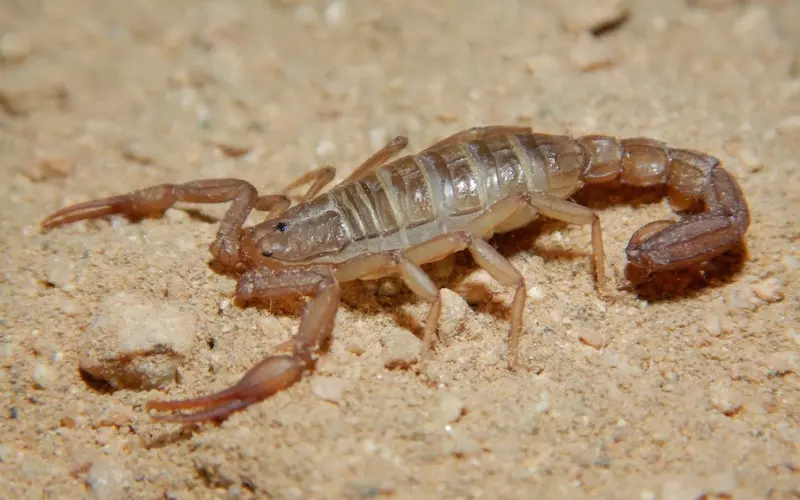
| Species | Dusky Scorpion (Scorpiones incertae sedis) |
| Longevity | Around 2-3 years |
| Good to own as a pet? | Not recommended for beginners |
| Legal to own? | Check local regulations |
| Adult size | About 2-3 inches |
| Diet | Insects and other small arthropods |
The Dusky Scorpion, also known as Scorpiones incertae sedis, is found in various places worldwide. These scorpions can live in deserts, forests, and your backyard! In their natural habitat, Dusky Scorpions hide under rocks and logs or in caves; they dig themselves. They like to stay in cool and dark places to avoid the hot sun.
While their sting is not usually lethal to humans, it can be excruciating, like a bad bee sting. It’s essential to be careful around them and not touch or bother them. If you ever get stung, seeking medical help is best to ensure you’re okay.
So, Dusky Scorpions are exciting creatures in different parts of the world, living in cool, dark spots and having a small, dark appearance. Remember, it’s better to admire them from a distance to stay safe!
Interesting facts about scorpions
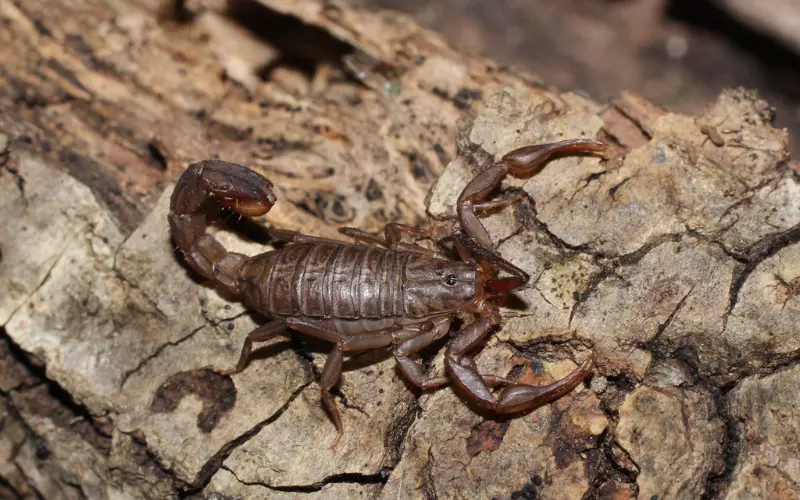
Scorpions are fascinating creatures with incredible secrets! These ancient arachnids have been around for millions of years and hold surprises like glowing in the dark and being expert sensors. Let’s explore these intriguing scorpion facts in simple terms!
- Glow in the Dark: Some scorpions can glow in the dark! They have a particular part in their body that lights up under ultraviolet (UV) light. It’s like having their nightlight.
- Ancient Creatures: Scorpions are ancient. They’ve been around for about 450 million years, way before dinosaurs!
- Superb Sensors: Scorpions have tiny hairs on their bodies that help them feel vibrations in the ground. This makes them great at sensing when something is coming close.
- Pincers and Stingers: They have two big pincers at the front and a curved tail with a stinger at the end. They use their pincers to grab food and stinger to defend themselves or catch prey.
- Survivors: Scorpions are tough survivors. They can survive without food for a long time and don’t need much water.
- Great Moms: Some scorpions are excellent moms. They carry their babies until they are big enough to care for themselves.
- Venomous but Not Always Deadly: Most scorpions have venom, but only a few are strong enough to harm humans. For many, a scorpion sting feels like a bad bee sting, but it’s usually not dangerous.
Scorpions might seem scary, but they play an important role in the ecosystem, helping control insect populations and keeping nature in balance.
Let’s Explore More About Scorpion
The Effects of Scorpion Stings on Humans

When a scorpion stings a person, it can be painful, like a bad bee sting. The area where it stings might swell, turn red, and hurt for a while. Sometimes, you might feel sick, with symptoms like nausea and muscle pain.
But here’s the good news: for most people, scorpion stings aren’t life-threatening. They might be painful and uncomfortable, but they usually get better independently. Some people might need a little medicine to help with the pain.
However, in some rare cases, scorpion stings can be more serious, especially if the scorpion is one of the few kinds with potent venom. If you get stung and feel very sick, it’s essential to tell an adult right away, and they’ll help you get the proper care.
So, while scorpion stings can be unpleasant, they’re usually not something to be too worried about!
How to Prevent Scorpion Encounters in and Around Homes
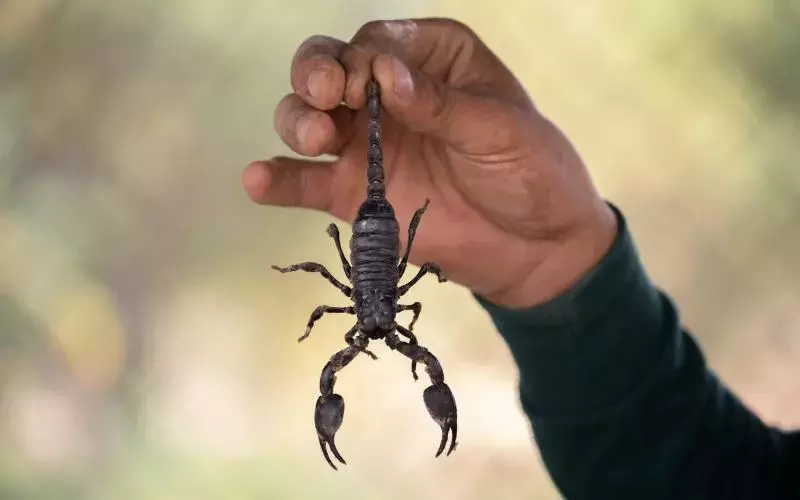
Preventing scorpion encounters in and around homes is essential for safety. Here are some tips to help keep scorpions at bay:
- Reduce Moisture: Scorpions are attracted to moisture. Fix any leaks, drips, or standing water sources in and around your home.
- Seal Trash Containers: Keep trash containers tightly sealed to avoid attracting insects, which can, in turn, attract scorpions.
- Regular Cleaning: Regularly clean and declutter your home. Scorpions like dark, cluttered areas, so maintaining a clean living space can help deter them.
- Use Yellow Lighting: Scorpions are less attracted to yellow lighting. Consider using yellow bulbs for outdoor lighting to reduce their presence.
- Remove Food Sources: Remove pests like ants, roaches, and crickets from your home. Scorpions prey on these insects.
- Professional Help: If you have a severe scorpion problem, consider hiring a pest control professional specializing in scorpion control.
While these steps can help prevent scorpion encounters, avoiding reaching into dark or hidden areas where scorpions may be hiding is essential. If you encounter a scorpion, contacting a pest control expert for safe removal is best.
Common Misconceptions About Scorpions
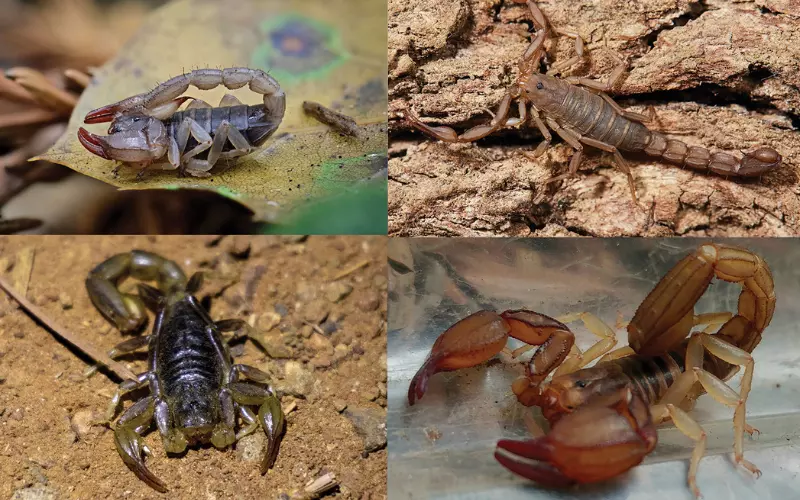
Misconceptions about scorpions often lead to unwarranted fear. Let’s unravel the truth behind these fascinating arachnids by dispelling common myths. Understanding scorpions can help us coexist peacefully with these essential creatures in our ecosystem.
- All Scorpions Are Deadly: While some species possess venom potent enough to harm humans, most scorpions have relatively mild venom. Fatalities from scorpion stings are extremely rare and mainly occur when people are allergic or if medical treatment is delayed.
- Scorpions Are Insects: Scorpions belong to the arachnid class, along with spiders, ticks, and mites. They are arachnids, not insects. One key difference is that they have eight legs, while insects have six.
- Scorpions Attack Humans: Scorpions are not naturally aggressive toward humans. They sting in self-defence when they feel threatened or when they’re hunting for prey. Most scorpions would rather escape than confront humans.
- Scorpions Are All Nocturnal: While many scorpion species are nocturnal (active at night) to avoid daytime heat, some are diurnal (active during the day). Their activity patterns depend on their habitat and the availability of prey.
- Scorpions Are All Large: Scorpions come in various sizes. While some species are large and imposing, others are small, measuring only a few inches.
- All Scorpions Glow in the Dark: Only some scorpion species can fluoresce or glow under ultraviolet (UV) light. This glow is caused by certain chemicals in their exoskeleton. It’s not a feature found in all scorpions and serves various purposes, including luring prey or attracting mates.
These clarifications help us better understand and appreciate scorpions, dispelling unfounded fears and myths associated with these intriguing arachnids.
Conclusion
Scorpions might not be the first creatures to come to mind in Georgia, but they’re here and have their unique story. Scorpions are like nature’s little mysteries, from their ancient history to their glowing secret and tiny hairs that help them sense the world.
While some might find them scary, they’re mostly not harmful and play an important role in our ecosystem. So, the next time you come across one of these little critters, remember they’ve been around for ages and have their special place in our planet’s big web of life!
FAQ’s
Q: Are there poisonous scorpions in Georgia?
A: Some scorpions in Georgia can deliver a painful sting but are not usually deadly to humans.
Q: Are there scorpions in Georgia?
A: Georgia is home to several scorpion species, including the Striped Bark Scorpion.
Q: What is the most common scorpion in Georgia?
A: The Striped Bark Scorpion (Centruroides vittatus) is one of Georgia’s most common scorpion species.
Q: What state has the worst scorpions?
A: Arizona is known for having some of the most venomous scorpions in the United States.
Q: What is the deadliest scorpion in India?
A: The Indian Red Scorpion (Hottentotta tamulus) is considered one of the most venomous scorpions in India.
Q: What scorpion has killed the most humans?
A: The Indian Red Scorpion has been responsible for many scorpion-related deaths in India.
Q: Which country has the most scorpions?
A: Countries in the Middle East, Africa, and South Asia have a high diversity of scorpion species, with the most found in regions with arid climates.
Q: Where do scorpions kill most people?
A: Scorpion-related deaths are more common in regions with limited access to medical care, such as rural areas in India, Africa, and the Middle East.
Q: What kills scorpions?
A: Scorpions can be killed using insecticides, physical removal, or by preventing their entry into homes by sealing cracks and gaps.
Q: Which scorpions are harmless?
A: Many scorpion species have mild venom that does not harm humans. Most scorpions are not aggressive and will only sting if they feel threatened.
Q: What is the world’s safest scorpion?
A: Scorpions from the family Buthidae, like the Emperor Scorpion, are considered safe pets due to their mild venom and calm behaviour.
Q: What is the Indian red scorpion venom?
A: The venom of the Indian Red Scorpion contains toxins that affect the nervous system and can be deadly to humans, particularly children.
Q: Which color scorpion is poisonous?
A: Scorpions of various colors can be venomous. Venomous scorpions come in different colors, including brown, black, and red.
Q: Do scorpions live in India?
A: Yes, scorpions are found in various regions of India.
Q: Where are scorpions mostly found in India?
A: Scorpions are commonly found in arid and semi-arid regions of India, particularly in states like Rajasthan, Maharashtra, and Gujarat.
Q: What is the scorpion’s biggest enemy?
A: Scorpions have various natural predators, including birds, mammals, and some insects, like centipedes and beetles.

Hey there, I’m Tyler Swan! I worked as an Animal Care Specialist at Neuralink and completed my education at the University of California, Davis. Animals have always fascinated me, so I chose to study and work with them.
In my job, I take care of animals and make sure they’re healthy and happy. I’ve had cool roles like Lab Manager and Senior Research Assistant at Mitloehner Lab, where I’ve learned much about animals.
I’m not just about work, though. I love animals so much that I write articles about them! I enjoy sharing fun and interesting facts about our furry and feathered friends.
If you ever want to know more about animals or need help with animal info, ask! I’m here to make learning about animals easy and fun, just like chatting with friends.

